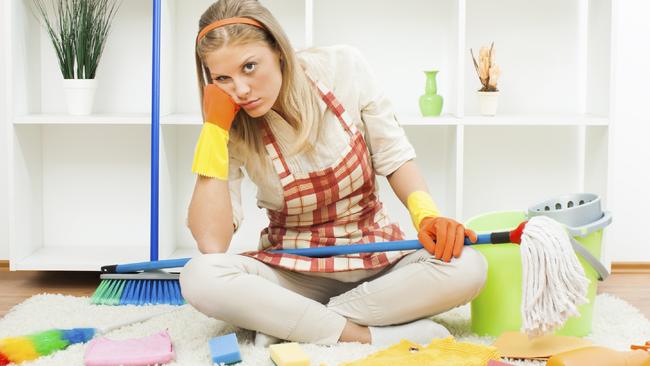Mum’s the word when it comes to household chores — but she’s not happy about it, new SA survey shows
Women are continuing to do the bulk of the housework and childcare in 2020 and it is sparking new, more intense, household unease, a nationwide survey of parents reveals.

SA News
Don't miss out on the headlines from SA News. Followed categories will be added to My News.
- ‘I hate you cancer’: Brave mum shares son’s fight
- South Aussie parents buck global pandemic trend
- Why blokes need a bit more bromance in their lives
A study by Adelaide-based researchers on family life in Australia has found women are continuing to do the bulk of the housework in 2020 and it’s fuelling tension between partners.
Flinders University professor in psychology Damien Riggs said the research, which has not yet been formally released, focused on three areas – distribution of household labour, contribution of caring for kids and disputes between couples.
He said issues had been exacerbated by the global pandemic with many people spending more time at home, including to work.
“The big question is, are men engaging more in household duties? Our data suggests they are not and this is a source of frustration,” Prof Riggs said.
“(The strong sentiment is), it might be lovely to have (Dad) home spending more time with the kids but if he’s not actually helping with the nappies, the cooking and cleaning, it is not really a help.”

Prof Riggs said the nationwide survey by the university’s Caring Futures Institute of more than 600 people – the majority of whom were women and primary carers – showed household disputes had intensified on the back of COVID-19.
“For people who were already having disputes in their relationship before COVID, they reported having more of them … so if cracks existed, these become more evident,” he said.
“We didn’t ask specifically what the disputes looked like, or if they had led to separation, but certainly they increased.”
The nature of the disputes will be examined more closely when in-depth interviews, held in conjunction with the surveys, are analysed.
Prof Riggs said families’ responses to the global pandemic provided an insight into how they might react in other emergencies and disasters.
“It allows us to assess how well prepared we are to support families through emergencies and disasters,” he said.
He said the early results showed the significance of ensuring support services are in place, to help people manage issues early.
“There has been really excellent engagement around the extreme end, so domestic violence services for example, but I would argue we need more support services in that space between,” Prof Riggs said.
“If you haven’t dealt with issues that have building for some time and then there is a crisis, those issues become compounded.
“Early intervention is always necessary but perhaps even more so during emergencies and disasters because we want to stop these things escalating to the extreme end.”
